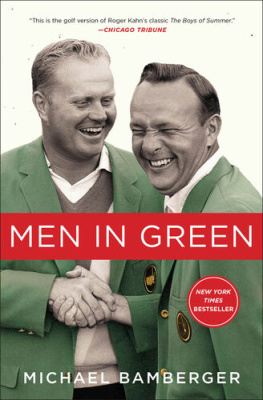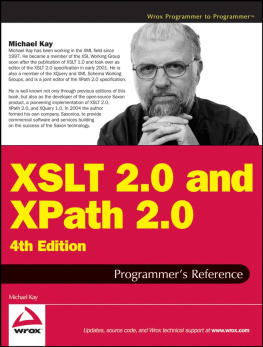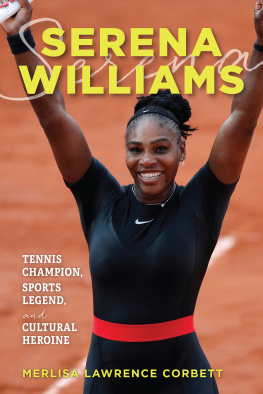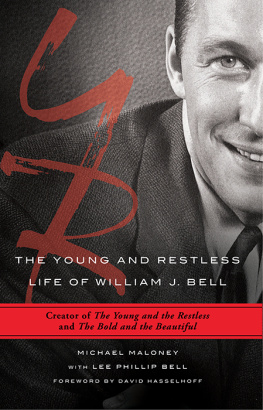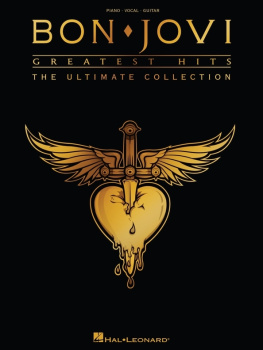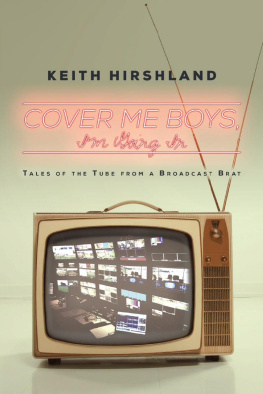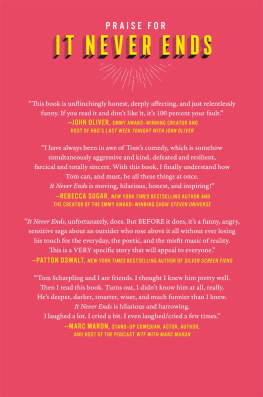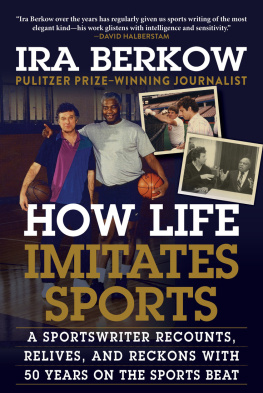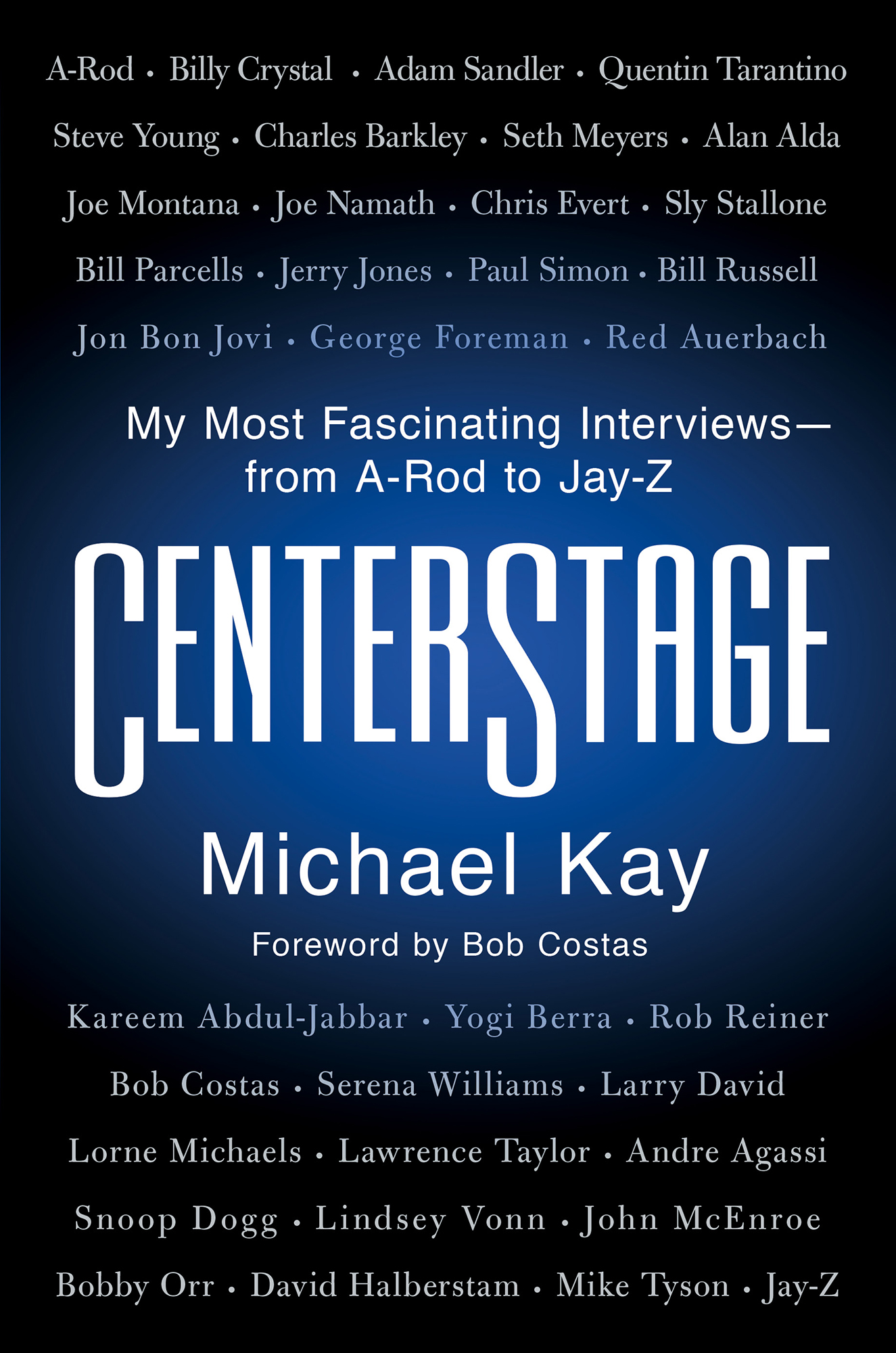Contents
Guide
My Most Fascinating Interviewsfrom A-Rod to Jay-Z
CenterStage
Michael Kay
Forword by Bob Costas
More Praise for CenterStage
CenterStage is another example of why Michael Kay is one of the truly gifted interviewers in the history of our industry. His ability to make all of these sports and entertainment giants feel so comfortable is extraordinary. I bet some felt afterward that maybe they became too comfortable. Its just one captivating interview after another. A mesmerizing book.
Mike Breen, play-by-play commentator for NBA on ABC and lead announcer for New York Knicks games on MSG Network
A fabulous new collection Kays greatest gift is an infectious personality that shows his guests at their best, encourages them to reveal their innermost thoughts, and even, at times, uncovers secret gems about their lives. On display in CenterStage is a Whos Who of pop culturefrom John McEnroe to Jon Bon Jovi, from Sir Charles to Sly Stallone, and including dozens moreand by the time you finish youll really feel you personally know them.
Jon Heyman, insider for MLB Network and former writer for Sports Illustrated
Even as a cub reporter Michael Kay had a unique ability to turn an interview into a conversation between friends. People trusted Michael then. They still do today, more than ever. CenterStage doesnt just allow readers to glimpse the souls of the rich and famous, its a how-to for any aspiring journalist learning the craft of the Q and A.
Bob Klapisch, coauthor, with Paul Solotaroff, of Inside the Empire
Michael Kay is a gifted conversationalist. He has the innate ability to make his interview subjects feel comfortable and get them to share fascinating details about their personal journeys. Its never cookie-cutter with Michael and always insightful and moving with the perfect balance of humor.
Ian Eagle, broadcaster for CBS Sports and YES Network
For Jodi, Caledonia, and Charles, who always take center stage in everything I do.
And for my sister, Debbie, her husband, Peter, and their childrenAshley, Chelsea, and Dylanwho long ago had to deal with my barrages of questions before it became my job.
Foreword
If you have watched and listened to Michael Kay on telecasts of Yankee games, a few things should be apparent. He knows baseball. He is steeped in Yankee history, the last thirty-four years of which he has experienced firsthand. He is adept at engaging with his various (and varied) broadcast partners. And heres something else: Michael sees not just pitches and plays, but story lines. He provides an ongoing narrativeof a game, a season, a career.
That last quality, missing in more announcers than you might realize, was shaped by Michaels background as a newspaper writer. The deft, unscripted turns of phrase he often delivers in big moments are a testament to a writers regard for the beauty and importance of words well chosen. Still, a writer who is also a reporter has objectives and skills beyond the writing itself. The reporter is naturally curious. Asking good questions is how he makes his livingand his reputation. If he is to do his job honestly and well, his powers of observation and eye for telling detail are essential. He is interested not in the superficial or rote response but in the truthful and relevant answer, the pertinent observation, the honest point of view.
Which brings us to CenterStage. There are many types of interviews, and they require different approaches. CenterStage is not 60 Minutes, Nightline, or Meet the Press. It is a conversation, not an interrogation. Seldom is there a specific issue to confront. Rather, the idea is to provide at least a slice of the guests personal biographyto get to some of the texture and shadings of a life and career. Ideally, the conversation should be both entertaining and, in some sense, revealing. At the end of the hour, the viewer should not only have learned a bit about the events, accomplishments, and perhaps controversies for which the guest is best known. The viewer should also have a better understanding and appreciation of the person behind all that.
When Michael asked me to write the foreword for this compilation of his CenterStage shows, I was flattered to learn that my NBC interview program, Later, was among his influences. While there are differences, there are also substantial similarities. We both recognize the importance of thorough preparation, but also are aware that you must be nimble and spontaneous enough to put the preparation aside and react in the moment when the conversation takes you in a different direction. You must be a good listener. That allows you to follow up, to clarify, to encourage the guest to tell more.
Like Later, CenterStage is not about sound bites or mindless celebrity trivialities. The guest has a body of work. A story to tell. And the long-form format allows it to unfold. There is plenty of room for laughter. But also thoughtful (though not somber) conversation.
Over years of conducting these conversations, Michael has arrived at some of the same conclusions I did. If you have put in the time and effort to be well versed on your subjects life and career, and if it is also clear that you had some knowledge of, and interest in, that person to begin with, the person senses that, even before you get to all the particulars. And that sense almost always leads them to become more engaged and forthcoming.
Heres something else I have discovered and Im sure Michael has as well: the atmosphere matters. Often, the best and most memorable responses come in reaction to specific questions. But not always. Sometimes, if the overall tone is right, if the guests trust the interviewer, if they have some regard for the reputation of the program and its host, that comfort factor leads them to share interesting thoughts and stories on their own. Or so it seems. Some of the best moments do seem to just happen. It seems as if the guest just decided to go there without any prodding. And in those instances, the host has done nothing obvious. Certainly nothing spectacular. What has happened is more subtle than that. An atmosphere has been created. An atmosphere that leads to good television.
Over the years, Michael Kay has delivered plenty of good television, much of it on CenterStage. The proof of that is on the pages that follow.
Bob Costas
March 2020
A Note to the Reader
Owing to space limitations, the CenterStage interviews featured in this book have been reduced from their original length, with care taken to be faithful to the speakers intended meaning while preserving the best exchanges.
Introduction
Ive always been curious. I want to know how someone got rich. How someone became poor. How someone handles fame. When I was a kid and my family was driving somewhere, Id stare up from the back seat at some of the windows of the homes that zoomed past and wonder what was going on in those apartments. What was their big issue and what was their struggle?
Ever since Ive been a broadcaster, Ive toyed with the idea of pitching a show with the working title Whats Your Story? In the show, Id take a camera and kneel down next to someone homeless in Penn Station and ask how exactly the person got to that point. Or maybe Id just knock on a door in an apartment building and ask what was going on in the persons life.

